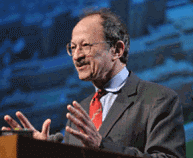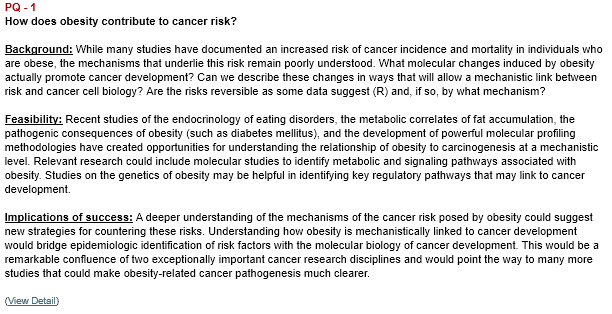
|
|
|
|
|
|
|
News & Views item - August 2011 |
![]() US National Cancer Institute Puts US$17.5 million on the Table
to Get Answers to 24 "Provocative Questions". (August 26, 2011)
US National Cancer Institute Puts US$17.5 million on the Table
to Get Answers to 24 "Provocative Questions". (August 26, 2011)
When former Director of the US National Institutes of Health, Harold Varmus, was invited back to head its National Cancer Institute, one of the reasons for his acceptance was the enticement of being in the position to pose a set of "provocative questions" (PQ), i.e. unsolved, paradoxical, or neglected research questions that deserve a closer look. And starting last northern Autumn Dr Varmus held a series of workshops to draw up the list.
The NCI has set aside US$17.5 million for grants to address the 24 questions set out.
Click here to access the Website which gives full details of the questions, listing the "background" of each question, the "feasibility" of undertaking the research and the "implications of success"
An example:

Below we list the 24 PQs in short form. The order is random, i.e. they have not been given relative priorities.
How does obesity contribute to cancer risk?
What environmental factors change the risk of various cancers when people move from one geographic region to another?
Are there ways to objectively ascertain exposure to cancer risk using modern measurement technologies?
Why don't more people alter behaviors known to increase the risk of cancers?
Given the evidence that some drugs commonly and chronically used for other indications, such as an anti-inflammatory drug, can protect against cancer incidence and mortality, can we determine the mechanism by which any of these drugs work?
What are the molecular and cellular mechanisms by which patients with certain chronic diseases have increased or decreased risks for developing cancer, and can these connections be exploited to develop novel preventive or therapeutic strategies?
How does the lifespan of an organism affect the molecular mechanisms of cancer development, and can we use our deepening knowledge of aging to enhance prevention or treatment of cancer?
Why do certain mutational events promote cancer phenotypes in some tissues and not in others?
As genomic sequencing methods continue to identify large numbers of novel cancer mutations, how can we identify the mutations in a given tumor that are most critical to the maintenance of its oncogenic phenotype?
As we improve methods to identify epigenetic changes that occur during tumor development, can we develop approaches to discriminate between "driver" and "passenger" epigenetic events?
How do changes in RNA processing contribute to tumor development?
Given the recent discovery of the link between a polyomavirus and Merkel cell cancer, what other cancers are caused by novel infectious agents and what are the mechanisms of tumor induction?
Can tumors be detected when they are two to three orders of magnitude smaller than those currently detected with in vivo imaging modalities?
Are there definable properties of a non-malignant lesion that predict the likelihood of progression to invasive or metastatic disease?
Why do second, independent cancers occur at higher rates in patients who have survived a primary cancer than in a cancer-na´ve population?
How do we determine the clinical significance of finding cells from a primary tumor at another site?
Since current methods to assess potential cancer treatments are cumbersome, expensive, and often inaccurate, can we develop other methods to rapidly test interventions for cancer treatment or prevention?
Are there new technologies to inhibit traditionally "undruggable" target molecules, such as transcription factors, that are required for the oncogenic phenotype?
Why are some disseminated cancers cured by chemotherapy alone?
Given the recent successes in cancer immunotherapy, can biomarkers or signatures be identified that can serve as predictors or surrogates of therapeutic efficacy?
Given the appearance of resistance in response to cell killing therapies, can we extend survival by using approaches that keep tumors static?
Why do many cancer cells die when suddenly deprived of a protein encoded by an oncogene?
Can we determine why some tumors evolve to aggressive malignancy after years of indolence?